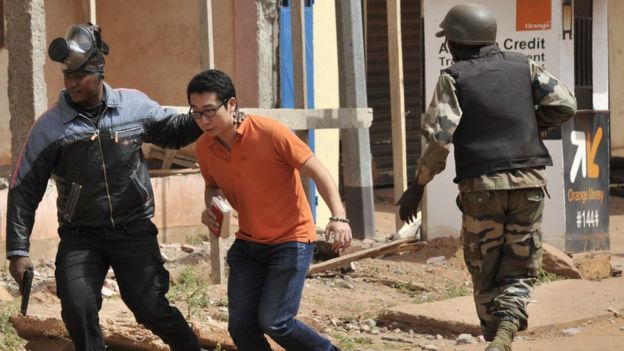Mali declares a state of emergency
A 10-day state of emergency has been announced in Mali following an attack on a hotel by suspected Islamist militants in the capital Bamako, in which gunmen killed 19 people.

President Ibrahim Boubacar Keita also announced three days of mourning. The president, who came home early from a regional summit in Chad, said two militants had been killed.
Al-Qaeda in the Islamic Maghreb and its affiliate al-Murabitoun said they carried out the attack.
More than 130 hotel guests were freed when Malian special forces, French special forces and off-duty US servicemen, stormed the Radisson Blu hotel to break the siege.
The National Security Council in the US has condemned the “heinous attack” which has also been deplored by China – three Chinese nationals and a US national are reported to be among the dead.
Earlier reports said at least 27 people had died. A UN official, who spoke on condition of anonymity, said 12 bodies were found in the basement and 15 on the second floor.
One of the hostages killed was Geoffrey Dieudonne, a member of parliament in Belgium’s Wallonia region.
UK Foreign Secretary Philip Hammond said three Britons in the hotel were safe.
Pictures showed that some of the hostages leaving the hotel were wounded.
US President Barack Obama said the attack was yet another reminder that the “scourge of terrorism” threatened many nations. He said the barbarity of the assault “only stiffens our resolve to meet this challenge”.
The US-owned hotel is popular with foreign businesses and airline crews.
Eyewitnesses said up to 13 gunmen had entered the hotel shooting and shouting “God is greatest!” in Arabic.
BBC Security Correspondent Frank Gardiner says that the claim by an obscure Saharan jihadist group allied to al-Qaeda that they were behind the attack is a reminder that the country still faces an insurgency.
In 2013 French forces effected a stunningly swift reversal of al-Qaeda’s takeover of most of Mali. But Mali is a large, poor country with porous borders and large areas of ungoverned space where jihadist groups have been able to hide and plan attacks.
It has not been helped by the ease with which weapons can come across from Libya, nor by the proximity of a murderous insurgency in Nigeria where Boko Haram reportedly killed more people last year than Islamic State did in Syria and Iraq.
Before special forces stormed the building, a security source told Reuters news agency that some hostages who were able to recite verses of the Koran were being freed.
There is as yet no established link with the attacks in Paris one week ago that killed 130 people.
In August, suspected Islamist gunmen killed 13 people, including five UN workers, during a hostage siege at a hotel in the central Malian town of Sevare.
France, the former colonial power in Mali, intervened in the country in January 2013, when al-Qaeda-linked militants threatened to march on Bamako after taking control of the north of the country.
The UN force in Mali took over responsibility for security in the country from French and African troops in July 2013, after the main towns in the north had been recaptured from the Islamist militants. BBC






